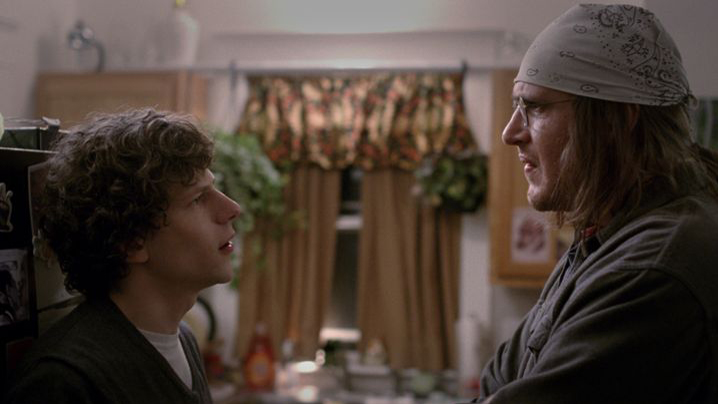James Ponsoldt’s The End of the Tour is about the five days Rolling Stone writer David Lipsky (author of And of Course You End Up Becoming Yourself, the book the film was based on) spent interviewing David Foster Wallace (acclaimed essayist and author of the thousand-something page novel Infinite Jest). But, while it is a primarily a film about Wallace, it is by no means a biopic.
By choosing a specific week of Wallace’s life as Tour’s focus, Ponsoldt is able to avoid all of the common biopic pitfalls and expertly achieves the “show don’t tell” screenwriting ideal. We come to know Wallace (Jason Segel) through his words and actions, his mannerisms, and what he is and isn’t comfortable talking about, not through a dramatized childhood or heightened first kiss.
Tour regards biographical details as unimportant and often reductive. Yes, Wallace tells Lipsky, he was an alcoholic, but to focus on that is missing the point; his drinking, along with each of his other compulsions, was a symptom—not the cause—of his depression. When Lipsky (Jesse Eisenberg) asks for, and is denied, permission to interview Wallace’s parents, the film comments on itself. No, you may not learn more about this person’s childhood, nor do you need to—he’s willing to tell you everything you need to know about himself, and nothing he’s unwilling to talk about really matters to the story being told.
Segel’s performance is truly awe inspiring. He perfectly embodies Wallace, nailing his cadences and mannerisms, but it never feels like he’s doing an impression—yet another thing that sets Tour apart from the standard biopic. Segel portrays a Wallace who is always the smartest person in the room despite his best attempts not to be. He mumbles and hunches with Midwestern self-consciousness, then distills all of the complex ideas and feelings you’ve never been able to articulate into one perfect sentence.
Eisenberg is equally brilliant as Lipsky—and he’s at a disadvantage, playing a character who is far less charismatic than Wallace. Eisenberg’s Lipsky manages to come across as simultaneously smug and insecure, affable and insufferable. He makes it remarkably easy for the audience to go from loving to despising him, a dynamic which is also heavily at play in his interactions with Wallace.
Tour is a very intimate film. Like Wallace insisting Lipsky stay at his house instead of in a motel, it invites you in far more than you would have expected it to. By its end, you feel as if you truly know Wallace—almost as if you are Wallace—perhaps because he is that rare person who found the words to describe a feeling you never realized was universal.
By avoiding the high-drama antics common to biopics, Tour is allowed to be something more honest—a film that feels like it is about a real person. It’s a film that, like its subject, is quiet, thoughtful, and deeply moving. For a movie about isolation, it does a great job of making you feel a little less alone. FL







